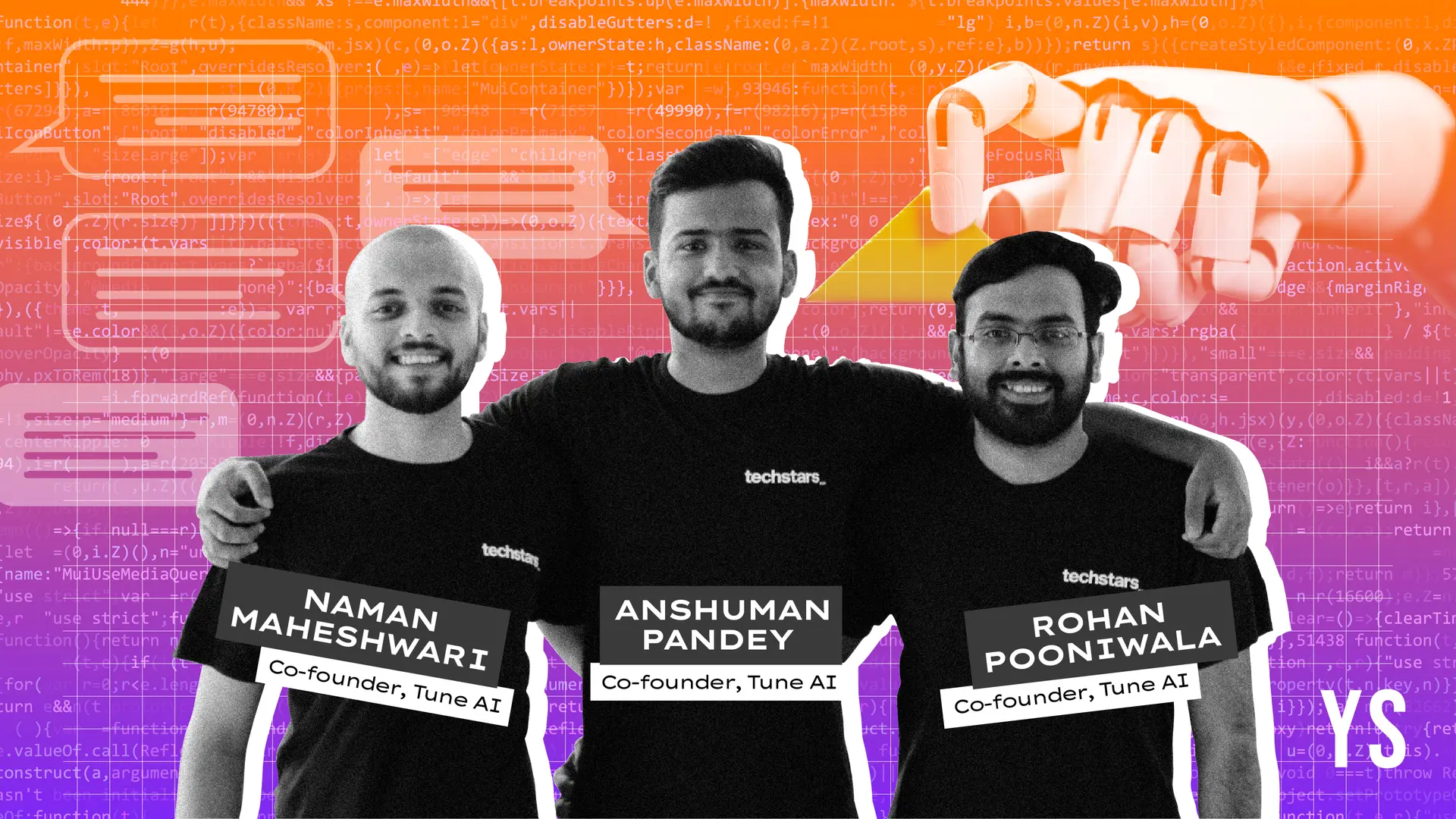Flipkart and Accel-backed Tune AI is enabling enterprises, developers deploy Gen AI for workflows
Started in 2018, the San Francisco and Chennai-based startup has over 360K users, and has raised funding from Flipkart, Accel, Together Fund, and others.
Around 2018, Anshuman Pandey, Naman Maheshwari, and Rohan Pooniwala were building solutions to simplify artificial intelligence (AI) development for machine learning (ML) engineers. The three met while pursuing their undergraduate degree at SRM University, Chennai, and later built Nimblebox.ai out of a hacker house (a workstation for developers) in the city of Kovalam.
The bootstrapped startup offered a comprehensive toolkit designed to help developers quickly set up their ML projects.
“What we wanted to do initially was help users get started with their ML projects quickly. We wanted it to be as easy, because there was a huge barrier to entry. We wanted to fix that and that's why we set out building Nimblebox.ai in its first iteration,” Naman tells YourStory.
The platform grew quickly, serving 16,000 developers from 200 companies in over 30 countries. However, in 2023, they noticed a rising demand for generative AI solutions. So, they shifted focus and created to help enterprises and developers leverage generative AI for their applications and workflows.
“We built machine learning models for enterprises and updated our platform to work with advanced language models. We were one of only four companies, alongside major players, to get Meta's Llama 2 available for internet users within just 24 hours of its release to the public,” he explains.
Prior to this, Rohan was setting up deep learning infrastructure at Harvard Medical School, Anshuman was researching ethical AI at Carnegie Mellon University, and Naman was conducting human-computer interaction research at IIIT Delhi.
Product offerings
The San Francisco and Chennai-based startup has two major offerings—Tune Chat and Tune Studio.
Tune Chat is an AI chat app that provides powerful models for text generation, code generation, and brainstorming.
“We are developing this platform for builders who are inculcating or incorporating Gen AI into their apps and products,” says Naman.
“Every company down the line will harness AI in some sort of shape or form. Tune Chat is a platform for knowledge workers of enterprises. This is mostly for companies or enterprises where your data security and privacy are paramount. So essentially, we help set this up internally in enterprises or behind their firewall where their employees can use our platform for content generation or writing assistance,” he adds.
Tune Studio is a comprehensive solution for fine-tuning, deploying, and managing the Gen AI model lifecycle and enabling data security with enterprise-grade compliance. Through its “Ultimate creative sandbox” playground, Tune Studio allows users to test open-source models and fine-tune performance.
“Anyone looking to incorporate Gen AI into their projects or applications are able to use the platform using both closed and open-source models,” explains Naman.
The startup also uses it to create automated workflows for large pharmaceutical and information services enterprises that have global operations.
The Applied AI team at Tune AI works on use-case-driven projects, either to maximise the efficiency of certain processes within enterprises or to bring novel technologies like agents into their workflow.
The startup claims to have managed to reduce the manual processing time of certain workflows by over 30 times and at a fraction of the cost for its enterprise customers.
Helping builders and developers
The Tune AI platform is built on open and closed-source models like ChatGPT, GPT-3.5, GPT-4, and Llama, allowing for flexibility and customisation.
“As of today, the 180,000 number of users has grown to somewhere around 360,000. We are gaining close to 3,000 new users every day,” says Naman.
Tune Chat assists strategic units within enterprises to get better insights. This could go from document intelligence to just assistance in general. A lot of these companies have their own data and documents, something that they can't give out of their firewall, he adds.
Enterprise workers can use the platform to gain better insights and get accurate sources for documents to make quick decisions.
“Tune Studio is being used by builders in AI to whip up quick prototypes, which is to build applications. Builders and developers today want to harness this new technology to essentially experiment and prototype new applications and move on to the next experiment. We’re also heavily optimising for that. Use cases could range from a simple API integration and LLMs to giving responses or building an AI agent. It’s basically a horizontal play,” he says.
Market and funding
Tune AI has raised over $4.4 million in funding from , , Flipkart, Techstars, CSVP Fund, and others this year.
"With the rapid advancements in generative AI and the growing need for efficient AI solutions, Tune AI stands out with its speed of execution in integrating the newest open source models into its platform. Their offerings, Tune Chat for developers and Tune Studio for enterprises, empower businesses to deploy, fine-tune, and benchmark AI models with ease. By helping enterprises optimise internal workflows and drive efficiencies, Tune AI is becoming the Red Hat for Open Source AI. We are excited to back their world-class team in their mission to make AI adoption seamless and impactful for Fortune 500 companies," Prayank Swaroop, Partner at Accel, tells YourStory.
The 25-member team claims to have over 360,000 users and multiple enterprise customers in the last six months.
“The core differentiation is our team and products. Our products have been gestating for over five years, it’s almost a domino effect where every platform feature we’ve built over the past half-decade is coming together now,” Naman says.
Some of its prominent customers include agriculture AI startup Kissan AI; AmalgamRx, a US-based healthtech firm; and Juicy Chemistry. Some of its other clients are from the information services and healthcare industries.
In terms of pricing, apart from a free plan with limited features, Tune AI offers a pro version at $20 per user/month and a custom enterprise plan with premium support, which would be customised based on budget and workflows.
Some of the other players in the space include San Francisco-based Scale and Imbue.
Any AI system needs to prioritise safety since they are prone to hallucination, says Naman.
“Hallucination is essentially the modern version of viruses. With our products, it makes it easy for developers or teams to bring down the probability of these systems hallucinating with several checks and balances in place. LLMs today are mostly trained on publicly available data on the internet. While LLMs hallucinate in giving answers from time to time, one can find similar answers just by searching the web,” he adds.
One of the major challenges the team faced while building the product was in the field of Generative Artificial Intelligence (Gen AI), where open-source models are not yet as effective as closed-source models.
Open-source models refer to software where the original source code is made freely available and can be modified and redistributed by anyone. Closed-source software, in contrast, keeps its source code proprietary, limiting access to the developers or vendors.
“Gen AI is a new field. Open-source models aren't as good as some of the closed-source ones. Open-source models need time to catch up to where closed-source models are today,” Naman explains.
According to a report by EY, India has the potential to add between $359 billion and $438 billion to its GDP in 2029-30 with the adoption of Gen AI, representing a 5.9% to 7.2% increase.
Looking ahead, the startup is focused heavily on optimising the platform for developers.
“We are looking to help 1 million developers to use generative AI for their own projects using our platform. We are also looking to cultivate the Indian ecosystem of developers and builders, having seen first-hand how the community in the Bay Area operates,” he adds.
(The article was updated make a correction)
Edited by Megha Reddy








